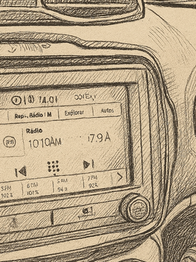Tariffs on Imports Don’t Help Industry !They Just Put Industrialists on Our Backs
- Ricardo Gurgel

- 27 de abr.
- 4 min de leitura
My name is Ricardo Gurgel, I’m an engineer and a consumer, and as a consumer, I need to express some frustrations so that the virus of protectionism isn’t idolized.
Brazil is not the most industrialized country in the region; on the contrary, it’s one of the countries that has lost the most industries, due to the fragility of our economic history and the competitive weakness caused by our addiction to protectionism. Forget the false math that says raising taxes on imported products creates jobs. Ironically, those who usually defend this idea are the same people with a historical hatred of entrepreneurs — and yes, it's the entrepreneurs, not the employees, who benefit when foreign competition is blocked.
Much more employment is created by the import industry than by a "protected" industrial park shielded by political cronies. Protectionism mainly serves to feed bureaucratic networks, creating high-paying leadership positions for political appointees, while you have to sell a kidney to buy a merely decent car or suffer to pay absurd prices for a computer. Owning an iPhone even feels like owning a small apartment!
These are the most obvious comparisons, but the impact goes far beyond: home renovations, wardrobes, hammers, dental restorations — everything gets more expensive. Like it or not, almost no national industry is fully independent. Even saving a tooth becomes more expensive because of import taxes. Your life could even be at risk due to unaffordable health plans or specific clinical treatments, since the medical field relies heavily on imported products.Taxation is basically the State saying:"Give me five apples, and as a gift, I’ll give you two. See how essential it is that I tax you, so you don’t go hungry!"
What Trump did in the U.S. doesn’t even come close to the philosophy of Javier Milei, nor to the free-market practices defended by the economic school that is currently guiding Argentina’s reforms — the same path followed by countries like New Zealand and others with high levels of human development and personal satisfaction.Yes, the freedom to buy what suits your interests contributes to individual happiness, and therefore, to the well-being of society as a whole.
I was particularly irritated when I compared the price of a product I intend to buy: first, the price without import taxes; then, the price of the same equipment already in Brazil, with taxes paid. It's an item that would interest less than 1% of the population, but it means a lot to me. Hobbies are like that — you can't explain desire. Imagine something you truly love — and the government making it three times more expensive, just to make it harder for you.
Dexism (the old hobby of "fishing" for distant radio signals across various bands) is a childhood passion of mine. The pleasure of hearing airport conversations, catching distant radios from faraway lands... even in these small joys, the State manages to interfere. Here’s the price breakdown:
Equipment price before taxes: R$ 487.63
Equipment price in Brazil, after taxes: R$ 1,305.40

And it doesn’t stop there: when it comes to more complex products like audio processors, specialized antennas, transmitters, and electronic components — even for national manufacturers — the entire supply chain is affected, often with cascading effects. So when you hear that the import tax is "only" 50%, remember that on top of that, there’s usually about 17% state sales tax (ICMS), depending on the state, and other specific taxes that can easily make the final price triple.
Which country is showing impressive signs of recovery after nearly falling into an economic abyss? Argentina. And its path is clear: spend less than it collects, cut taxes for local industry, and reduce import tariffs to encourage competition, making the consumer the greatest beneficiary.When the consumer is the primary winner, the economy flourishes.
Industrialists shouldn’t be protected simply because they’re based in the country. A consumer would rather buy an iPhone for half the price than wait twenty years for a domestic company to build a phone that will already be obsolete by 2045. If consumers can choose between national and imported products at good prices, they will constantly push local industry to strive for excellence. And in that fight, paradoxically, the local industry will become more competitive, respected, and successful internationally.
Meanwhile, Brazil remains stuck in the eternal joke of protectionism. There was a time when the country tried to heavily tax computers under the naïve hope that we would invent our own wheel and develop a local tech industry.And what did we get? Nothing.The automotive industry, fully protected, gave us overpriced, problematic, ugly cars, true street barges and this has a lot to do with the radio industry on many levels!
Protectionism is irritating.It distances us from personal satisfaction and from progress.
It's not just an ideological issue: every Brazilian feels it in their wallet. While in other countries (with more open markets) people buy better and cheaper products, here we pay a high price for lower-quality stuff and everyone sees and experiences this, it’s not an abstraction.
Brazilian empiricism dismantles protectionist arguments that, in theory, might even seem reasonable.












Comentários